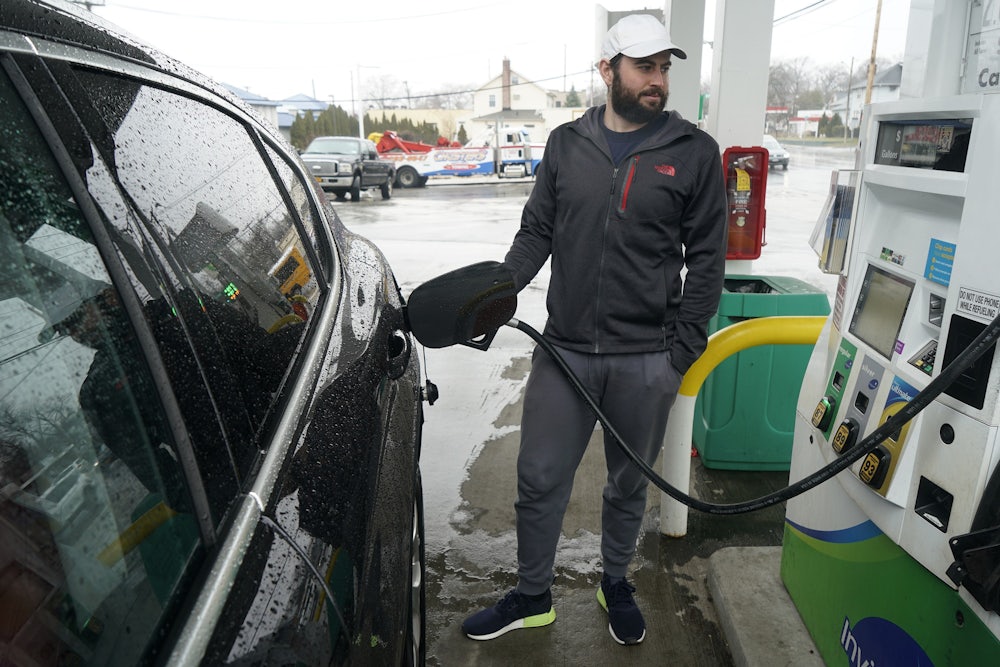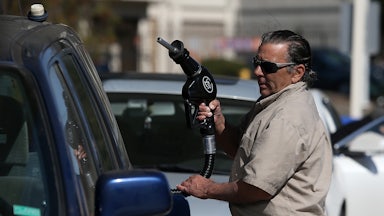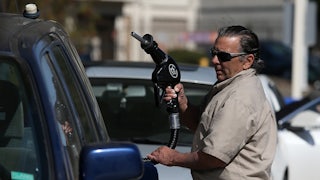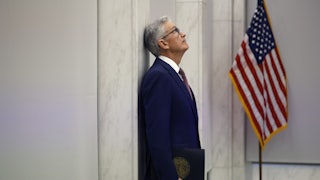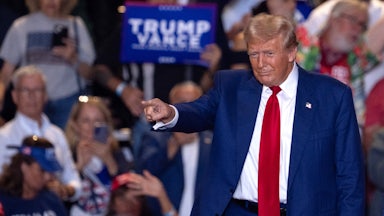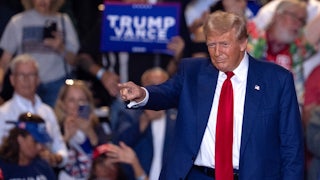Absent any context, a gas tax holiday would seem like a no-brainer policy to implement. Gas is expensive, and oil prices have recently spiked as Russia escalates its conflict with Ukraine. The rising costs have come as American families face other economic pressures, including persistent inflation at its highest rate in decades. For a president struggling with low approval ratings, and a tenuous Democratic majority in Congress bracing for significant losses in the upcoming midterm elections, cutting the gas tax looks like it could be just what the spin doctor ordered.
Gas prices have risen significantly over the past year, with the national average for a gallon of gas up 90 cents more than it was in 2021. The likely impending invasion of Ukraine has had a ripple effect on the oil market, with the national average for a gallon of gas costing $3.53, four cents more than last week, according to AAA. In his remarks announcing a “first tranche” of sanctions on Russia yesterday, President Joe Biden said the administration is “closely monitoring energy supplies for any disruption.”
“We’re executing a plan in coordination with major oil-producing consumers and producers toward a collective investment to secure stability and global energy supplies,” Biden said. “This will blunt gas prices. I want to limit the pain the American people are feeling at the gas pump. This is critical to me.” A White House spokesperson also told The Washington Post last week that “every tool is on the table to reduce prices.”
A few Senate Democrats, including four who happen to be up for reelection this fall in hotly contested races, introduced a bill earlier this month to suspend the federal gas tax until the end of the year. “We need to continue to think creatively about how we can find new ways to bring down costs, and this bill would do exactly that, making a tangible difference for workers and families,” said New Hampshire Senator Maggie Hassan in a statement introducing the bill. Hassan can point to favorable polling on the matter: As Politico reported Wednesday morning, fresh numbers from the most recent Politico/Morning Consult poll indicate that 68 percent of voters say that they “support a temporary pause on the gas tax, including 75 percent of Democrats, 62 percent of independents, and 65 percent of Republicans.”
Democrats are not the only ones considering a gas tax holiday; proposals that would cut state gas taxes are being considered in several states, including the Republican-led Tennessee, Missouri, Florida, and Ohio. (However, some state lawmakers are skeptical about how much such policies would actually help.)
Senate Democrats discussed a gas tax holiday during their party lunch last week, and Senate Majority Leader Chuck Schumer described it as “one of the many things that we’re looking at in terms of reducing costs.” But any legislation to cut or suspend the gas tax would need support from at least 10 Republicans as well as all 50 Democrats in the Senate, which seems unlikely. Senate Minority Leader Mitch McConnell blasted the idea in floor remarks last week, noting that the holiday would expire after the midterm elections, and Republican Senator John Barrasso described the gas tax holiday as a “gimmick to end all gimmicks.” When asked whether Republicans could support a gas tax holiday, Senator John Thune, the Republican whip, replied: “I can’t see that scenario.” Democratic Senator Joe Manchin also pumped the brakes on a gas tax holiday, saying last week that “it doesn’t make sense to me.”
The critics calling out gimmickry may have a point. The relief offered by suspending the gas tax may be less than one might expect. The federal gas tax, which has not been increased since 1993, is 18.4 cents per gallon for regular gasoline and 24.4 cents for diesel fuel. (The legislation proposed by some Democrats does not include the tax for diesel fuel, which McConnell called a “a slap in the face to truckers and a further burden on the supply chain.”) With the addition of state taxes and fees, the average driver pays roughly 39 cents per gallon of gasoline on top of the federal tax, according to the American Petroleum Institute.
Taxes only accounted for 15 percent of the cost of gas in January, per the U.S. Energy Information Administration, while crude oil contributed to 56 percent of the cost of a gallon. Moreover, in previous state-level gas tax holidays in Illinois and Indiana, 70 percent of savings were passed on to consumers, meaning that as much as 30 percent was captured by oil producers, and retail gas prices dropped by only 3 percent. A 2020 study by the Transportation Investment Advocacy Center analyzing changes to gas taxes in 29 states found that only one-third of state gas tax increases or decreases are passed on to consumers in the price of gasoline, with “no measurable impact after that point.”
Marc Goldwein, the senior director of policy for the Committee for a Responsible Federal Budget, argued in an interview with The New Republic that a gas tax holiday would provide only a small amount of relief, and not decrease inflation by a significant amount. He also predicted that gas stations and oil companies would increase the pretax prices if a suspension was implemented.
“The economy is so overheated at this point, it’s so saturated with demand, that if people have more money in their pocket and spend, it is probably going to increase inflation elsewhere in the economy,” Goldwein said. “And when the gas tax comes back, you’re going to see even higher inflation, because you’re both going to have the reimposition of the gas tax and then higher demand.”
The federal gas tax raises revenue for the Highway Trust Fund, which pays for most transportation spending and is already facing insolvency in the coming years. According to an analysis by the Committee for a Responsible Federal Budget, the proposed gas tax holiday would reduce gas tax revenues by roughly $20 billion, which would cut the highway fund’s revenue stream nearly in half. The proposed legislation would offset that loss by directing the Treasury Department to transfer general revenue to the fund.
“Suspending the 18.4 cents per gallon federal gas tax is not going to give consumers significant relief—if any at all—at the pump because the oil companies will just add the forgone federal tax to their coffers in whole or part,” said Representative Peter DeFazio, the chair of the House Committee on Transportation and Infrastructure, in a statement last week. DeFazio called the gas tax holiday a “well-intentioned but ill-conceived policy that counts on the good will of oil companies to succeed and undermines the long-term positive impacts of the bipartisan infrastructure law” that passed in the fall and included $118 billion for the highway fund.
In a letter to Senate leadership earlier this month, David Bauer, the president and CEO of the American Road and Transportation Builders Association, raised concerns that the proposed gas tax holiday would “alter the carefully negotiated revenue structure that will pay for” the bipartisan infrastructure law. “It must also be emphasized such a proposal would establish a precedent that the federal gas tax should be suspended during times of economic distress or when fuel prices are deemed too high,” Bauer said. “Such a practice would surround the largest single source of revenue for federal highway and public transportation investment with disruptive uncertainty.”
Goldwein also argued that a gas tax holiday would “make the climate situation worse.” The United States does not have a carbon tax to put guardrails on fossil fuel emissions, but the gas tax does provide some incentive for drivers to buy fuel-efficient cars. In 2019, emissions from transportation accounted for 29 percent of total U.S. greenhouse gases, according to the Environmental Protection Agency. Transportation accounted for more than 36 percent of U.S. carbon dioxide emissions from fossil fuels in 2020, with passenger vehicles, freight trucks, and light-duty trucks accounting for roughly 80 percent of those emissions, the EPA found.
“Whether you care about the deficit, whether you care about infrastructure, whether you care about climate, or whether you care about getting inflation truly under control, this moves in the wrong direction,” Goldwein said.
The idea of a gas tax holiday has long been floated by politicians as a way to ease the pinch on Americans’ pocketbooks. During the 2008 presidential campaign, Hillary Clinton and John McCain endorsed the idea of suspending the federal gas tax. But then-Senator Barack Obama called it a “gimmick” that was “designed to get them through an election.”
“The easiest thing in the world for a politician to do is tell you exactly what you want to hear,” Obama said.
